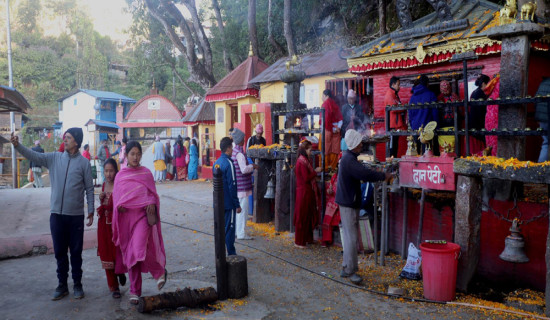- Friday, 21 November 2025
Global Cooperation Needed To Curb Monkeypox
Monkeypox, once a neglected tropical disease largely confined to remote parts of Central and West Africa, has emerged as a global health challenge. The 2022 outbreak, with cases spreading across non-endemic regions, served as a stark reminder of the interconnectedness of today’s world and the vulnerabilities of global health systems. The first case of monkeypox was reported from Nepal in June 2024. Monkeypox, once a localised health concern, has transformed into a global issue, underscoring the urgency of robust prevention strategies. The lessons from recent outbreaks are clear that prevention is not only more cost-effective but also critical to saving lives and protecting public health systems.
The unexpected spread of monkeypox to non-endemic countries exposed critical gaps in public health systems. Early detection and response mechanisms faltered, with many countries unprepared for a disease they had not considered a serious threat. This delay in recognising and addressing the outbreaks allowed the virus to spread widely, particularly in urban settings with dense populations. One of the most troubling aspects of the 2022 outbreak was the stigma attached to certain groups. Monkeypox cases were initially concentrated among men who have sex with men, leading to misinformation and discrimination. Such stigma not only hinders effective public health responses but also alienates affected communities, preventing them from seeking timely care.
Epidemiology
Monkeypox, caused by the Orthopoxvirus, was first identified in 1958 in monkeys used for research, with the first human case reported in 1970 in the Democratic Republic of Congo. Historically, it remained endemic in certain African regions, where zoonotic transmission from infected animals like rodents and primates to humans was the primary mode of infection.
Monkeypox spreads through close contact with an infected person, animal, or contaminated surfaces. Human-to-human transmission occurs via respiratory droplets, bodily fluids, and skin lesions. Additionally, zoonotic transmission by direct or indirect contact with infected animals plays a significant role in endemic regions. These dynamics highlight the need for comprehensive prevention measures addressing both human and animal health.
Monkeypox is caused by the monkeypox virus which also includes the smallpox virus. While less severe than smallpox, monkeypox symptoms such as fever, headache, muscle aches, and a characteristic rash can cause significant discomfort and health complications. The disease is primarily zoonotic, transmitted from animals to humans, but human-to-human transmission through close contact has played a significant role in recent outbreaks.
Recent outbreaks have shown a marked deviation from traditional patterns. Cases have surged in Europe, North America, and Asia, regions previously considered non-endemic. Close physical contact has emerged as a significant transmission route, particularly in social and sexual networks. Dense population centers have facilitated rapid spread. Human encroachment into wildlife habitats increases contact with animal reservoirs, enhancing zoonotic spillover risks.
Several factors have contributed to the resurgence and spread of monkeypox. Routine smallpox vaccination ended in the 1980s, leaving a large proportion of the population susceptible. Increased international travel has amplified the speed and scope of outbreaks. Limited surveillance and response capabilities in endemic regions delay containment efforts.
Early detection and response are fundamental to preventing monkeypox outbreaks. Governments and health organisations must prioritise monitoring and reporting cases swiftly. Equipping professionals to identify and manage monkeypox effectively is equally important. It is to remember that vaccines developed for smallpox are about 85 per cent effective against monkeypox. While vaccination campaigns have ramped up in recent outbreaks, ensuring equitable access remains a challenge. Therefore, focus on high-risk groups, including healthcare workers and individuals in endemic areas should be prioritised. Wealthier nations must assist low-income countries in accessing vaccines and treatments. Public knowledge about monkeypox is essential to prevention.
Mass campaigns should focus on recognising symptoms and seeking timely medical attention. Hence, understanding transmission routes and adopting preventive measures, such as avoiding contact with infected individuals and animals. Individuals should practice good hygiene, such as frequent handwashing and avoiding contact with suspected cases. In outbreak scenarios, isolation of infected individuals and disinfection of contaminated areas are crucial.
Misinformation and stigma can derail prevention efforts, especially when outbreaks disproportionately affect certain communities. Public health messaging must be inclusive, factual, and culturally sensitive to build trust and encourage cooperation. In this situation acknowledging one health approach is important. Preventing monkeypox requires addressing its zoonotic origins. This involves identifying and managing animal reservoirs. Preventing illegal and unsafe interactions with wild animals and preserving habitats to reduce human-wildlife conflicts.
Global cooperation
The monkeypox outbreak underscored the importance of global cooperation in addressing health crises. In an era of rapid travel and interconnected economies, no country is immune to the ripple effects of infectious diseases. The lessons learned from monkeypox should inform our strategies for tackling future pandemics, emphasizing preparedness, equity, and compassion.
The epidemiology of monkeypox underscores the interconnectedness of human, animal, and environmental health. While its spread into non-endemic regions is alarming, it also presents an opportunity to strengthen global health systems and advance the “one health” agenda. By investing in surveillance, research, and prevention, we can not only combat monkeypox but also prepare for future zoonotic threats. Preventing monkeypox is not just a health issue but an economic and social imperative. Therefore, governments, international organizations, and communities must collaborate to build resilient health systems that can preempt and contain outbreaks.
(Dr. Lohani is the executive director at the Health Concern. lohanis@gmail.com)















